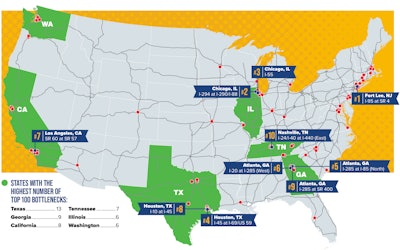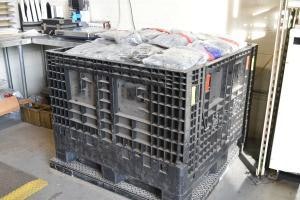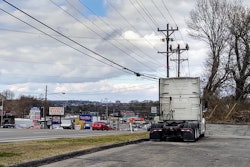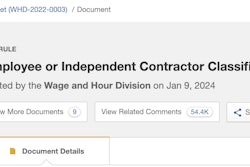Trucking news and briefs for Tuesday, Feb. 13, 2024:
G.W. Bridge tops ‘Truck Bottleneck’ list
 Texas, Georgia and California are the states with the most freight bottlenecks in the country, according to ATRI's analysis.ATRI
Texas, Georgia and California are the states with the most freight bottlenecks in the country, according to ATRI's analysis.ATRI
The George Washington Bridge at the intersection of I-95 and State Route 4 in Fort Lee, New Jersey, is the No. 1 worst freight bottleneck in the country, topping the list for the sixth year in a row.
The annual Top Truck Bottleneck List put out by the American Transportation Research Institute measures the level of truck-involved congestion at more than 325 locations on the National Highway System. The analysis, based on an extensive database of GPS data, uses several customized software applications and analysis methods, along with terabytes of data from trucking operations, to produce a congestion impact ranking for each location. ATRI’s truck GPS data is also used to support numerous state and federal freight mobility initiatives.
The bottleneck locations detailed in the latest ATRI list represent the top 100 congested locations.
After the George Washington Bridge bottleneck, the remaining 10 worst bottlenecks are, in descending order:
- Chicago: I-294 at I-290/I-88
- Chicago: I-55
- Houston: I-45 at I-69/US 59
- Atlanta: I-285 at I-85 (North)
- Atlanta: I-20 at I-285 (West)
- Los Angeles: SR 60 at SR 57
- Houston: I-10 at I-45
- Atlanta: I-285 at SR 400
- Nashville: I-24/I-40 at I-440 (East)
Congestions on the highway system “inflicts an enormous cost on the supply chain and environment, adding $95 billion to the cost of freight transportation and generating 69 million metric tons of excess carbon emissions every year,” said ATA President and CEO Chris Spear. “The freight bottlenecks identified in this report provide an actionable blueprint for state and federal transportation officials on where to invest infrastructure funding most cost-effectively.”

The full bottlenecks report includes detailed information on each of the top 100 bottleneck locations, as well as animations created with GPS date for select locations.
[Related: Texas again home to the worst traffic in the U.S.]
More than 1,000 pounds of alleged meth seized from truck at border
U.S. Customs and Border Protection officers assigned to the World Trade Bridge in Laredo, Texas, recently seized hard narcotics that totaled more than $9.5 million in street value.
 U.S. Customs and Border Protection officers seized more than $9.5 million worth of alleged meth from a truck at the World Trade Bridge in Laredo, Texas.U.S. CBP
U.S. Customs and Border Protection officers seized more than $9.5 million worth of alleged meth from a truck at the World Trade Bridge in Laredo, Texas.U.S. CBP
The seizure occurred on Tuesday, Feb. 6, at the World Trade Bridge, when a CBP officer referred a 2004 Freightliner hauling a refrigerated trailer manifesting a commercial shipment of roses for secondary inspection. Following a canine and non-intrusive inspection system examination, CBP officers discovered more than a thousand pounds of alleged methamphetamine within the commodity. The narcotics combined had a street value of $9,507,568.
CBP seized the narcotics. Homeland Security Investigations special agents are investigating the seizure.
[Related: Smuggled tramadol found in-cab at border]
Iowa’s harvest weight limit exemption extended another 10 days
Grain, fertilizer and manure haulers traveling on non-interstate highways and roads in Iowa are getting another 10 days to operate outside normal weight restrictions.
Iowa Gov. Kim Reynolds on Feb. 12 signed an extension to the harvest proclamation that has been in effect since Sept. 11 and has now been extended five times since. Previous extensions were in one-month increments, but the latest extension is for just 10 days.
The proclamation, now effective through Feb. 23, allows trucks transporting corn, soybeans, hay, straw, silage, stover, fertilizer (dry, liquid and gas), and manure (dry and liquid) to be overweight (not exceeding 90,000 pounds gross weight) without a permit for the duration of the waiver.
It applies to loads transported on all highways within Iowa (excluding the interstate system) and those that don't exceed a maximum of 90,000 pounds gross weight. Other stipulations that must be met to take advantage of the exemption:
- The load cannot exceed the maximum axle weight limit determined under the non-primary highway maximum gross weight table in Iowa Code § 321.463 (6) (a) and (b) by more than 12.5%
- The load cannot exceed the legal maximum axle weight limit of 20,000 pounds
- Drivers must comply with posted weight limits on roads and bridges








